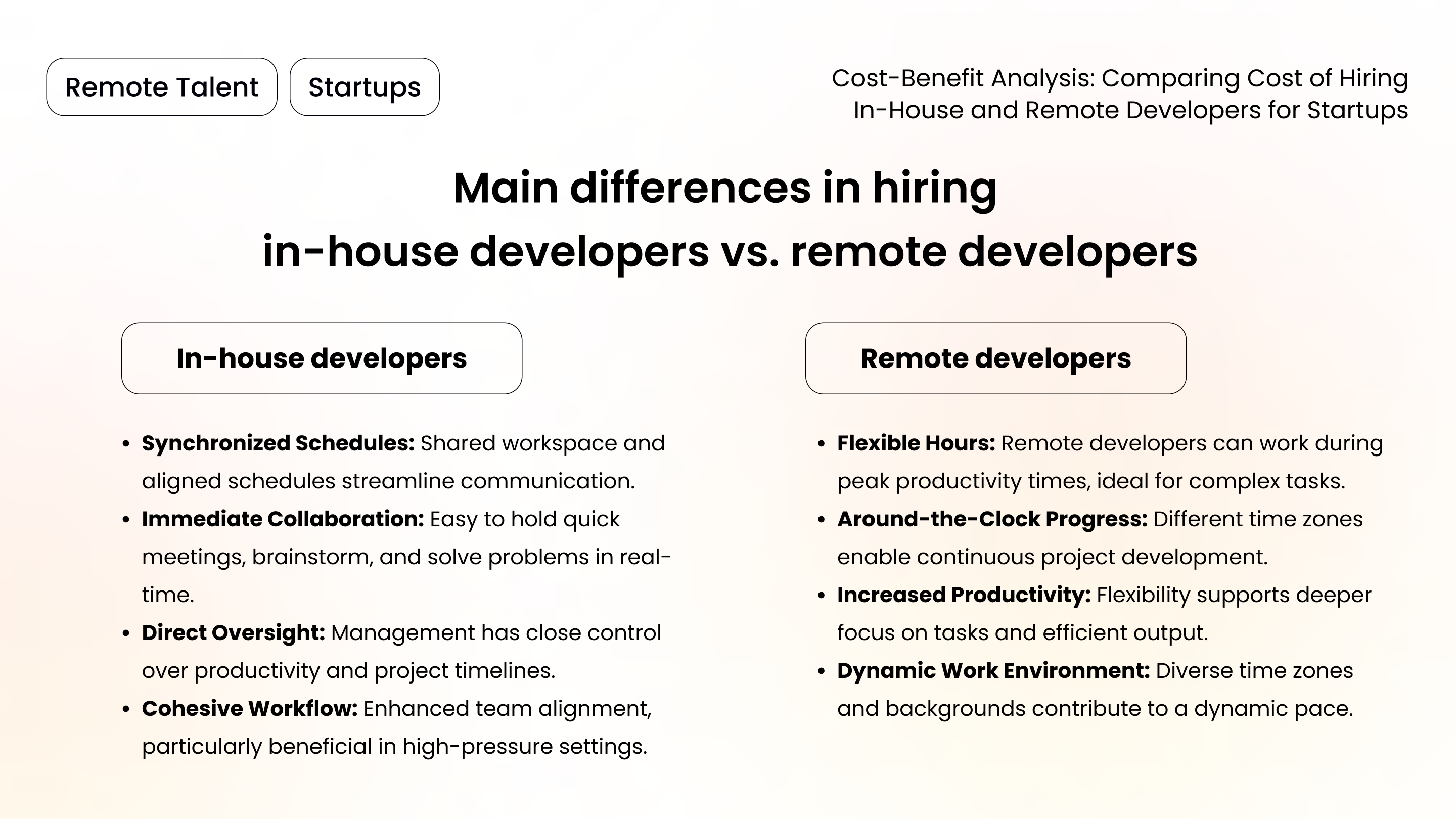In the dynamic world of startups, hiring the right developers is more crucial than ever. Whether to bring developers in-house or to leverage remote talent is a choice that can shape a startup’s future. But how do you decide?
With a comprehensive cost-benefit analysis, you can evaluate these options based on budget, project scope, and long-term goals. Here we’ll explore the factors that matter most and help you make an informed decision.
Hiring Cost of Developers
In-House Developers
Hiring in-house developers comes with a series of fixed costs that can feel heavy for a nascent startup. Salaries form the base of these costs, but they are only the beginning. Office space, equipment, and employee benefits such as health insurance and retirement plans add to the financial burden. Additionally, the time and resources invested in onboarding and training new team members can be significant. Retention also demands investment in perks like bonuses and career development opportunities to keep top talent from jumping ship.
Despite these costs, in-house developers offer the advantage of greater team cohesion and control over workflows. This can translate to faster problem-solving and higher-quality output, two things startups desperately need.
Remote Developers
Remote developers, on the other hand, offer a more flexible and often less expensive solution. By eliminating the need for office space and equipment, startups can save significantly on overheads. Many remote developers work as freelancers or contractors, which allows for scalable workforce solutions without long-term commitments.
Additionally, remote developers expand a startup’s access to a global talent pool, enabling them to find skilled professionals at competitive rates, especially in lower-cost regions. This flexibility can be particularly beneficial for startups needing to pivot or scale quickly without the constraints of traditional hiring processes.

Access to Talent and Skills
In-House Developers
The talent pool for in-house developers is limited by location, which can restrict access to specialized skills. This is particularly challenging for startups situated in smaller cities or regions where tech skills might be scarce. However, having an in-house team fosters greater cohesion and alignment with company values, enhancing productivity in the long run.
With in-house developers, startups can enforce work standards and ensure a unified approach to project goals. The ability to directly manage and influence the team’s output is a significant advantage, as it allows for real-time adjustments and quality control.
Remote Developers
Remote developers open the door to a much broader talent pool. By recruiting globally, startups can access specialized skills essential for highly technical or niche projects. This diversity brings fresh perspectives and diverse approaches to problem-solving, which can significantly benefit innovation and creativity within the company.
Furthermore, remote developers often have expertise in specific areas, allowing startups to hire for particular needs without extensive training. This specialized focus can be crucial for startups looking to implement cutting-edge technology or unique solutions quickly.
Developer’s Productivity and Flexibility
In-House Developers
In-house teams benefit from synchronized work schedules and a shared physical workspace, which streamlines communication and fosters immediate collaboration. Team members can easily align on goals and tasks, hold impromptu meetings, and engage in rapid brainstorming sessions. This setup enhances problem-solving capabilities and accelerates project timelines.
Management has direct oversight of in-house teams, ensuring consistent productivity and adherence to deadlines. These factors can lead to a more cohesive workflow and better project outcomes, especially in high-pressure startup environments.

Remote Developers
Remote developers offer flexibility that can lead to increased productivity. With the ability to set flexible working hours, developers can focus on tasks during times when they are most productive, particularly for complex projects requiring deep concentration.
The global nature of remote teams can also facilitate around-the-clock development, with work continuing as teams in different time zones overlap. This near-continuous progress can result in faster delivery times and a more dynamic work environment.
Communication and Collaboration
In-House Developers
Face-to-face communication is a significant advantage of in-house teams. Immediate feedback can prevent delays in project timelines, and in-person discussions reduce the risk of misunderstandings. This direct interaction fosters a collaborative culture that’s harder to replicate remotely, leading to stronger team bonding.
In-house teams often enjoy a more intuitive collaboration process, with fewer barriers to communication and more opportunities to build personal connections. This environment supports a more cohesive team dynamic and can enhance overall productivity and job satisfaction.
Remote Developers
Remote developers rely heavily on digital tools for effective communication. Video calls, messaging apps, and project management software become essential for maintaining clear and structured communication. This reliance can reduce ambiguity in project requirements and task distribution, though it requires disciplined management to avoid misalignments.
While challenges such as time zone differences can lead to delays, they can be mitigated with well-structured communication strategies and regular team check-ins. The key is to leverage technology effectively to bridge the gap between remote and in-house communication.
Security and Data Protection
In-House Developers
With all team members in one location, startups have greater control over security protocols and can address issues quickly. Dedicated infrastructure, such as firewalls and on-site servers, can protect sensitive information and reduce the risk of data breaches.
In-house teams generally pose less of a threat in terms of data leakage compared to remote teams using varying networks. This centralized control is especially beneficial for startups handling sensitive or proprietary data.
Remote Developers
Remote work introduces potential vulnerabilities, particularly when developers use public or home networks. To mitigate these risks, startups must implement strict cybersecurity protocols, such as VPNs, encrypted communication, and multi-factor authentication.
Additionally, managing third-party risks is crucial for freelance remote developers. Startups need to ensure that proprietary data is securely handled and that confidentiality agreements are in place to protect their interests.
The bottom line
Deciding between in-house and remote developers is not a one-size-fits-all choice. Each option presents unique benefits and challenges that startups must carefully consider based on their specific goals, budget, and project needs. In-house developers offer team cohesion, control, and security, while remote developers provide flexibility, cost savings, and global talent access.
For many startups, a hybrid approach—combining an in-house core team with remote specialists—can be an optimal solution. This strategy balances stability with flexibility, allowing startups to harness the strengths of both models and drive growth in a competitive market. Ultimately, by leveraging the advantages of each approach, startups can build a resilient, innovative team that positions them for success.





